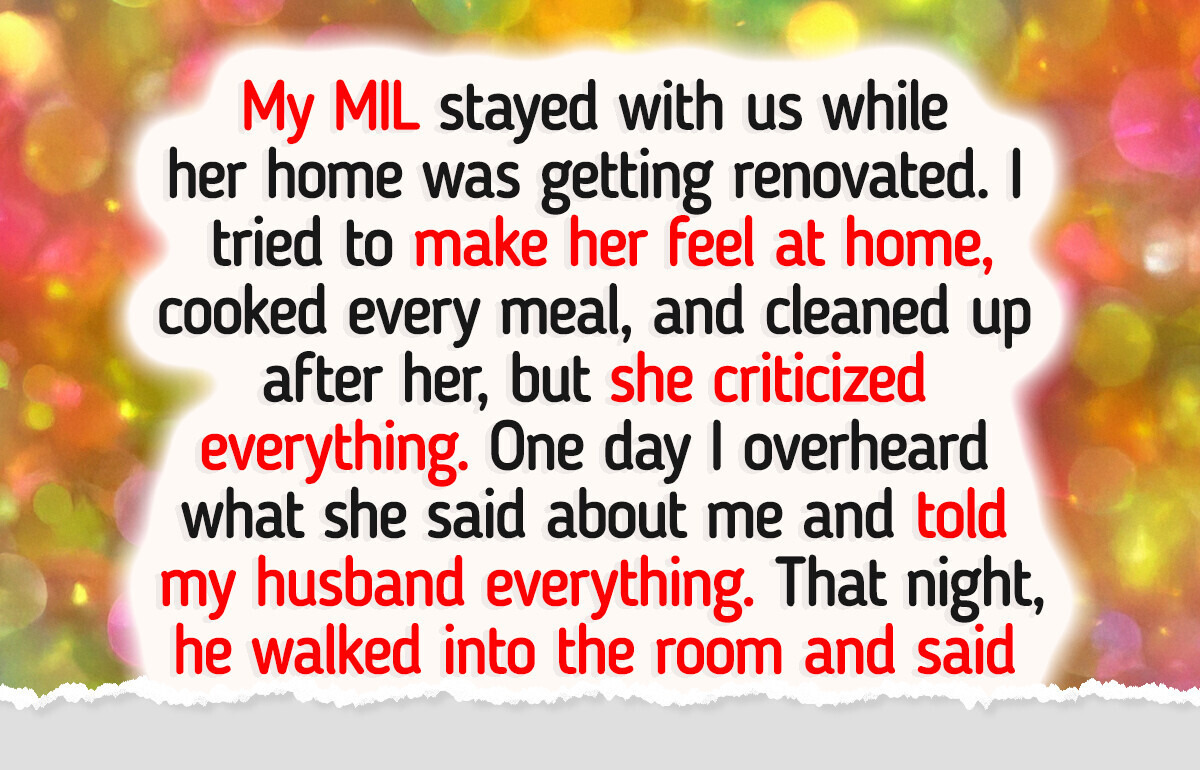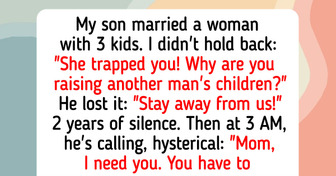One of the best article.
My MIL Treated Me Like a Maid, My Husband Told Her What She Needed to Hear

Getting married means becoming part of a new family, but it doesn’t mean giving up your dignity or independence. For many people, joining their partner’s family can be a beautiful experience, full of support, love, and connection. But sometimes, things aren’t so simple when a new family member crosses the line.
That’s exactly what happened to one of our readers. Here’s her story.
At first, I thought she was just being helpful.
When I married Adam, I genuinely thought his mom and I would get along. She was always polite when we were dating, brought over homemade cookies, and even complimented my cooking once or twice. But after our wedding, things shifted.
She started visiting more often. Then she started making comments like, “You’re not going to make him eat leftovers, are you?” Or, “The bathroom mirror looks a little smudged. Want me to show you a better cleaning spray?”
At first, I laughed it off. Maybe she was just trying to be helpful in her own way.
But a short visit revealed something more.
One day, my mother-in-law told us she needed to stay for a few nights while her home was undergoing renovations. I said yes, trying to be kind. I had no idea what I was agreeing to. The moment she arrived, she made herself completely at home and made me feel like a maid in my own house.
She left her dishes wherever she pleased. She demanded breakfast by 9, fresh towels by noon, and made remarks like, “You really should keep the windows cleaner. It’s the first thing guests notice.”
She never said please. Never offered to help. And worst of all — she acted like it was my job to serve her.
The day she truly crossed the line.
One day, she actually rang a little bell she’d brought from her bedroom and said, “Could you heat up my tea, dear?”
That’s when I realized: this wasn’t just inconsiderate. This was disrespect.
I hit my breaking point.
What hurt me most wasn’t the chores, I could handle laundry and dishes. It was the way she spoke to me. Like I was beneath her. Like I didn’t deserve to be her son’s wife. I tried to hide how much it bothered me.
But one evening, as I was cleaning up after dinner, I overheard her on the phone. She said, “I don’t know what Adam sees in her. She’s not exactly wife material. She plays house, but she has no idea what she’s doing. I have to keep this place running.”
I stood in the hallway, frozen. That was the moment I knew something had to change.
My husband’s response surprised me.
That night, I sat down with Adam and told him everything. I didn’t want to cause problems between him and his mom, but I couldn’t keep pretending everything was fine. I expected him to say something like, “She doesn’t mean it,” or “Let’s just wait until her place is ready.”
But instead, he stood up, walked straight into the living room, and said, “Mom, we need to talk. Right now.”
The cards were laid out.
He didn’t raise his voice. He didn’t argue. But his words were clear.
“Mom, I love you. But this isn’t working. You’re not being respectful to my wife, and I won’t allow that in our home. She’s not your maid, she’s my partner. If you can’t treat her with kindness, I think it’s time to go back to your place or find somewhere else to stay.”
My mother-in-law was stunned. She tried to defend herself, but my husband stayed firm.
For once, I felt seen. Respected. Supported.
She left the next morning without saying much.
A surprising turn of events

A week later, my mother-in-law called. I hesitated to pick up. But her voice was softer this time. She said she hadn’t realized how her behavior had affected me, and that she’d like to apologize — in person.
We met for coffee. She didn’t become a new person overnight, but it was the first real step toward a healthier relationship. And the biggest difference? She started treating me like family — not staff.
Here’s what we think:
This story has a happy ending, and it’s because the woman stood up for herself. If you ever find yourself in a similar situation, here’s what you should remember:
- When someone is condescending, it’s more about them than you: Insecurity, superiority complex, narcissism, and learned behavior are just some of the reasons someone may put you down. If they do, remember this is them, not you.
- Be honest and open with your partner: Family dynamics can be tricky, but it’s important for couples to stand together as a team, no matter whose family it is. If a family member is bullying you, let your partner know.
- Accountability starts when you stand up for yourself: Sometimes some people don’t realize how rude they are being. If you let them walk all over you, they’ll keep doing it. Setting your expectations will help them understand your boundaries.
Blurred boundaries in families are not uncommon. Here’s a similar story about a daughter who treated her mother like a free maid.
Comments
This worked because her husband had her back. Most stories like this are about a spineless mommy's boy who won't defend his wife.
Related Reads
I Refuse to Pay for Family Vacations Just Because I’m Childless

I Refused to Give Up My Seat to an Old Woman—My Money, My Choice

15 Success Moments From Strangers That Deserve All the Golden Buzzers in the World

15 Moments That Show Kindness Is Quiet but Changes Everything

10 Powerful Stories That Show Kindness Always Finds Its Way Back

15 Moments That Prove Quiet Kindness Doesn’t Break, Even When We Do

I Refuse to Be My Brother’s ATM Anymore—The Revenge He Planned Was Sick

My Family Always Prioritized My Sister—Then Expected Me to Help Them With Medical Bills

11 People Who Chose Humanity Over Hatred in the Darkest Moments

I Refuse to Help My Pregnant Sister, and I Don’t Feel Guilty

12 Stories That Prove Real Kindness Is About Actions, Not Words

16 Stories That Prove Kindness Still Wins in Our Broken World



